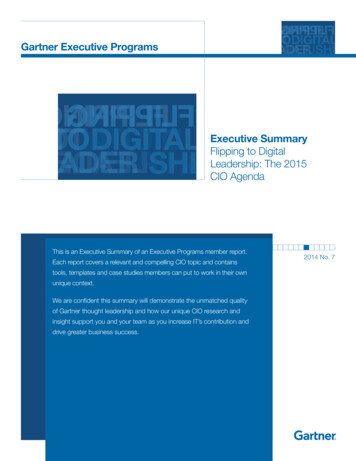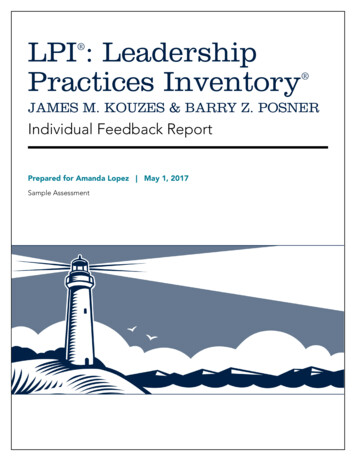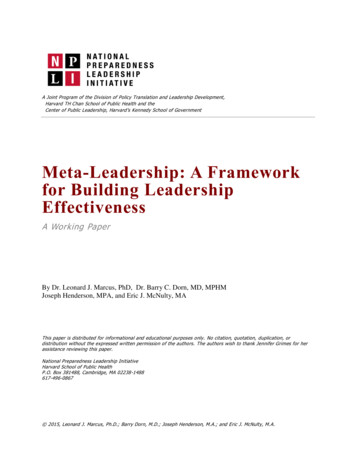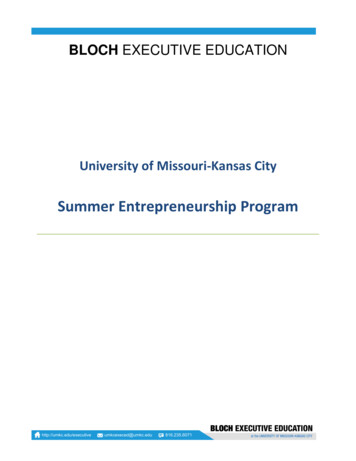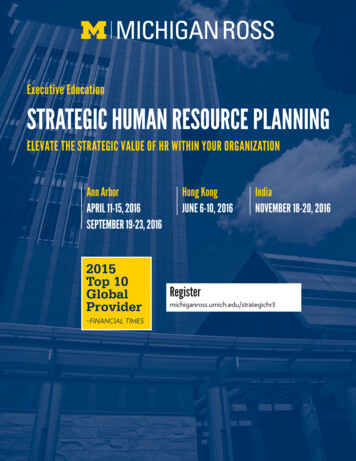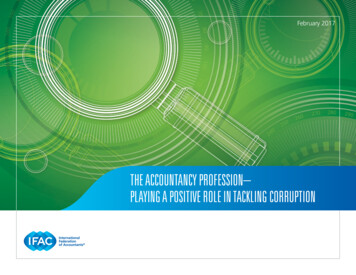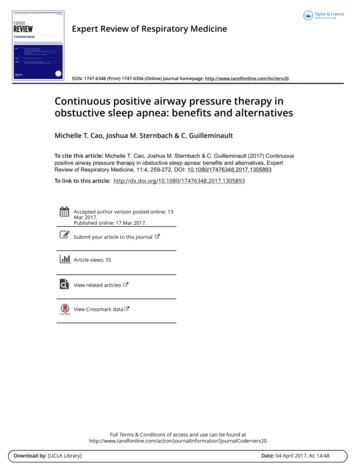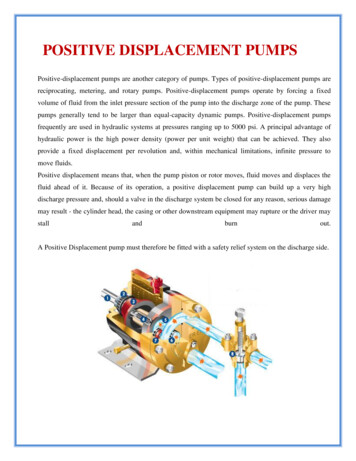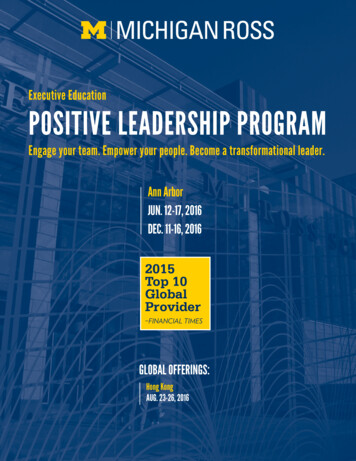
Transcription
Executive EducationPOSITIVE LEADERSHIP PROGRAMEngage your team. Empower your people. Become a transformational leader.Ann ArborJUN. 12-17, 2016DEC. 11-16, 20162015Top 10GlobalProvider–FINANCIAL TIMESGLOBAL OFFERINGS:Hong KongAUG. 23-26, 2016
POSITIVE LEADERSHIP JUNE 12 - 17, 2016 DECEMBER 11-16, 2016execed.bus.umich.edu/profile/register.aspx rossexeced@umich.edu 734-763-1000POSITIVE LEADERSHIPEngage your team. Empower your people. Become a transformational leader.Top-performing companies around the globe have come to believe that positive leadership is not only effective – it’s essential.Michigan Ross is the world’s leading home for research onbuilding positive organizations defined by engaged employees,empowered people, and a culture of collaboration and commitment. After more than ten years of research by Ross’ Center forPositive Organizations, we have learned how leaders motivate,inspire, and transform their organizations. In this program, youwill discover your leadership strengths and learn new strategiesand techniques for energizing and engaging employees, drivingchange and innovation, and delivering value to customers.You’ll emerge prepared, confident, and motivated to transformyour organization’s culture, drive innovation, and radicallyimprove your bottom line.Individual Benefits: Discover your leadership strengths and how to build on thesestrengths to create value for your team and organization Develop strategies to enhance employee engagementand create a culture of collaboration and commitment Enhance your ability to create, influence, and fosterorganizational change Build an action plan for deep change in yourself and othersOrganizational Benefits: Leaders who have the skill to develop high-impactrelationships and a culture of collaboration withcommitment to results A step-by-step plan to overcome an organizationalchallenge and realize positive change immediatelyupon return to work Increased drive to achieve exceptional individual andorganizational performance
Who Should AttendMid- and senior-level leaders seeking to develop a collaborative and committedorganization defined by engaged employees and transformational leaders.TYPICAL TITLES INCLUDE:DirectorVPSenior ManagerGroup Manager/DirectorThe ExperienceIn this program, you’ll engage in an exciting and intense journey toward becoming a transformational leaderwho can engage employees, inspire people, and build a culture defined by collaboration and commitment.Participants engage in the following program topics through a combination of action-learning experiences,interactive lectures, group discussions, team exercises, case studies, and real business projects.DAY Define personal case projects to be addressed this weekONE Identify challenges, issues, or opportunities that represent(1/2 DAY)real needs Form collaborative peer coaching relationships Set expectations for end-of-the-week presentations What is Positive Leadership, and why is it critical to success? Clarify the role of leadership vision Create collaborative relationships with peer participants Reflected Best-Self Feedback ExerciseDAY Provide the business case for Positive LeadershipTWO Identify abundance gaps versus deficit gaps Dramatically increase productivity, creativity, andwell-being by focusing on the organization at its best Highlight differences between positive and negative motivation Introduce Positive Leadership practices Personal management interview program –one-on-one meetings Energy network maps – create your team’s energy networkmap and use it to build a culture of engagement Creating micro moves for macro change The affirmative bias – an orientation toward strengthrather than weakness, optimism rather than pessimism,and supportive rather than critical communicatioDAY Provide the business case for employee engagement - whatorganizations practicing Positive Leadership have experiencedTHREE Identify how to manage jobs, careers, and callings Working with financial, social, intellectual, andideological capital Setting Everest goals for yourself, your team, and yourorganization Bringing purpose into focus to drive organizationalcommitment and results Achieving goals that exceed by a wide margin the bestperformance in the industry Creating a thriving culture Four key areas to avoid burnout and extend sustainability Building a high-performance environment Authentic leadership – an intense reflective experience torediscover the leader in youDAY Building your positive organizationFOUR Traditional versus transformational language Choose deep change or allow slow death? Entering the Fundamental State of Leadership Determining what result you want to create Becoming other-focused and internally directed Embracing an open and learning mindset Unlock greatness and sustainable success Expanding the zone of possibility The flourishing triangle High-quality connection audit High-quality connection scorecard and how to implement Your reflected best self assessment What if you could be the best version of yourself?How to maximize your strengths every day, all day Review your reflected best self feedback from othersCommon themes?Create your personal best-self statement Identify what keeps you from being your best self How can you help others be the best version of themselves? Your life purpose: How does it relate to your organization’s vision?Does it help you lead and build or manage and maintain?DAY Positive organization generatorFIVE Explore 100 research-based practices for building apositive organization defined by engaged employeesand a culture of commitment Five exercises to apply the positive practices Learn how to apply the practices in your organization Challenges you’ll face when applying positive practicesand how to address them in your organization Moving from transactional employment to purpose-driven,mutually supportive employment Personal case projects Update with new knowledge Small group presentations – hear and give feedback toenhance your personal case projectDAY Personal case projects – faculty and full-class peer review,SIX feedback Sharing leadership purpose statements Action plans for return to work – peer and faculty review Personal change commitments
POSITIVE LEADERSHIP JUNE 12 - 17, 2016 DECEMBER 11-16, 2016execed.bus.umich.edu/profile/register.aspx rossexeced@umich.edu 734-763-1000KIM CAMERON CO-DIRECTORWilliam Russell Kelly Professor of Management and OrganizationsProfessor Cameron is the William Russell Kelly Professor of Management and Organizations at Ross as well asprofessor of higher education in the School of Education, both at the University of Michigan. Past assignmentsinclude serving as Associate Dean of Executive Education at Ross, as Dean and Albert J. Weatherhead Professorof Management at the Weatherhead School of Management at Case Western Reserve University, and as AssociateDean and Ford Motor Company/Richard E. Cook Professor in the Marriott School of Management at BrighamYoung University. He has also served as a department chair at the University of Michigan, and served on the facultiesof the University of Wisconsin-Madison and Ricks College. Cameron organized and directed the OrganizationalStudies Division of the National Center for Higher Education Management Systems in Boulder, Colorado.Professor Cameron helped co-found the Center for Positive Organizations at the University of Michigan,which in 2012 was awarded the Research Center Impact Award by the Academy of Management. This awardrecognizes researchers and research centers that have made a major impact on real-world management practice.Cameron’s past research on organizational virtuousness, downsizing, effectiveness, quality culture, and thedevelopment of leadership excellence has been published in more than 120 academic articles and 15 scholarlybooks. He was recently recognized as being among the top 10 scholars in the organizational sciences whose workhas been most frequently downloaded from Google. His current research focuses on the virtuousness of and inorganizations, and their relationship to organizational success.Cameron received BS and MS degrees from Brigham Young University and MA and PhD degrees from YaleUniversity. He served on the National Research Council, was president of Bay Asset Funding Corporation, andwas a Fulbright Distinguished Scholar. Cameron is a graduate of Leadership Cleveland, Class of 2000, and arecipient of the Organizational Behavior Teaching Society’s Outstanding Educator Award. He currently consultswith a variety of business, government, and educational organizations in North America, South America, Asia,Africa, and Europe.“Management is about solving problems. Leadership is about changing culture.”ROBERT E. QUINN CO-DIRECTORMargaret Elliot Tracy Collegiate Professor in Business Administration; Professor of Management and OrganizationsRobert Quinn holds the Margaret Elliot Tracy Collegiate Professorship at the University of Michigan and is also a co-founder of theCenter for Positive Organizations. He has published 18 books on thesubjects of leadership, organizational change, and effectiveness. Recentbooks include The Positive Organization: Breaking Free from Conventional Cultures, Constraints and Beliefs; Deep Change Field Guide; Lift:Becoming a Positive Force in Any Situation; and The Best Teacher in You:How to Accelerate Learning and Change Lives.Professor Quinn is a fellow of the Academy of Management and ofthe World Business Academy. He was a co-recipient of the Academyof Management’s 2010 Martin Trail Blazer Award for opening newdirections in the field of organization theory. He is also the recipientof the 2011 Marion F. Gislason Award, presented for lifelong contributions to the field and practices of leadership. Quinn’s paper on PositiveLeadership was selected by the Harvard Business Review as one of theten all-time classics in self-leadership.Quinn is particularly well-known for his work on the Competing ValuesFramework, which is used in organizations across the globe. He has 40years of experience in assisting organizations with cultural change.–Robert QuinnSHAWN QUINN CO-DIRECTORConsultant, LIFT ConsultingShawn Quinn is the Managing Partner for LIFT Consulting and aPartner in the Competing Values Company. He is also an executive education instructor at Michigan Ross and teaches courses on leadership,change, and innovation. Shawn also plays a key role at the University ofMichigan’s Center for Positive Organizations.Shawn has consulted with leading organizations such as GeneralElectric, Coca Cola, Telefonica O2, American Express, Reuters, andthe U.S. Army. At Prudential Retirement, for example, he guided theirinternal change agent team in building a positive corporate culture. AtGeneral Electric he helped design and run the initial idea generationprocess for one of their Imagination Breakthrough projects. At theUniversity of Michigan Health System he facilitated sessions with theleadership in the Office of Clinical Affairs to clarify strategic prioritiesand projects that would best help the group to create their agreedupon desired outcomes. Shawn has also helped facilitate the Competing Values Change and Innovation Assessment with over one hundredteams and organizations.Shawn is the co-author of the McGraw-Hill book, “Leading Innovation: How to Jumpstart Your Organization’s Growth Engine,” and has coauthored five other articles and book chapters on change, engagement,and positive leadership.Shawn received a Master’s degree in Organizational and SocialPsychology from Columbia University. He earned a BS in Psychologyfrom the University of Utah while simultaneously earning a certificate inExperience Based Learning and Training from National Training Labs.Shawn also worked for Knight Transportation, where he was responsiblefor a number of key strategic projects.
JANE DUTTONRobert L. Kahn Distinguished University Professor of BusinessAdministration and PsychologyGRETCHEN SPREITZERKeith E. and Valerie J. Alessi Professor of Business Administration;Professor of Management and OrganizationsGretchen Spreitzer is the Keith E. and Valerie J. Alessi Professor ofBusiness Administration at Michigan Ross. She joined the Ross facultyin 2001 after spending nine years on the faculty at the University ofSouthern California’s Marshall School of Business. She was also a visitingprofessor at the Australian School of Business in Sydney in 2008.Spreitzer’s research focuses on employee empowerment andleadership development, particularly within a context of organizationalchange and decline. Her most recent research entails examining howorganizations can enable thriving. This is part of a vibrant movementin the field of organizational behavior known as positive organizationalscholarship.Based on extensive field research, she has authored many articles oncontemporary issues in organizational behavior in leading journals suchat the Academy of Management Journal, the Academy of ManagementReview, Administrative Science Quarterly, and the Journal of AppliedPsychology.Spreitzer has previously directed the Center for Positive Organizationsand the Ross Leadership Initiative. She teaches electives on LeadingOrganizational Change for MBA and BBA students as well as theMultidisciplinary Action Projects course.Prior to her doctoral education, Spreitzer worked with the managementconsulting group at Price Waterhouse’s Government Services Officeand with Partners for Livable Places, a not-for-profit urban planningfirm in Washington, D.C. She has a Bachelor of Science in SystemsAnalysis from Miami University (in Ohio) and completed her doctoralwork at Michigan Ross.Professor Dutton received the 2015 lifetime achievement award fromthe Organizational Behavior Division of the Academy of Management.Dutton is a world expert in the field of positive organizational scholarshipand a co-founder of the Center for Positive Organizations. She is aDistinguished University Professor, which is the highest award given toa faculty member at the University of Michigan. She received her PhDin Organizational Behavior from Northwestern and served on the strategyfaculty at New York University before joining Ross and the psychologydepartment. She has won teaching awards at every university where shehas been on the faculty and has won the top research awards at Rossand in her field of management and organizational behavior.Dutton’s research and teaching sit at the intersection of strategy,management, and psychology. She has received tenure in all threefields. Her research focuses on processes that build on the capabilitiesand strengths of employees in organizations. In particular, she examineshow high-quality connections and identity processes increase employees’and organizations’ capabilities. Her research has explored compassionand organizations; resilience and organizations; and energy andorganizations. Her research on compassion, job crafting, and positiveidentities has appeared in the Harvard Business Review, representingthree of the over 100 articles she has published in peer-reviewedjournals. She has published 13 books, including her most recent bookwith Gretchen Spreitzer, How to Be a Positive Leader: Small Actions, BigImpact, which is one of her two books that concentrates on managers.Dutton consults and works with a variety of organizations. For 10years, she served as co-director of the Interdisciplinary Committee ofOrganizational Studies, which is the largest interdisciplinary communityof organizational scholars at any university. She serves on the Board ofDirectors for Kelly Services and has worked with over 160 organizationsas a faculty coach with teams of MBA students doing consulting onstrategy, marketing, and leadership projects.WAYNE E. BAKERRobert P. Thome Professor of Management and Organizations;Chair of Management and OrganizationsWayne Baker is the Robert P. Thome Professor of BusinessAdministration and professor of management and organizations atMichigan Ross. He is also professor of sociology at the University ofMichigan and a faculty associate at the Institute for Social Research.He was the first director of the Center for Positive Organizations andrecently completed a three-year term as chair of his department.Baker’s teaching and research focuses on positive organizationalscholarship, values, and social networks. His latest book is UnitedAmerica: The Surprising Truth about American Values, American Identity,and the 10 Beliefs that a Large Majority of Americans Hold Dear. Hisother books include Achieving Success Through Social Capital, America’sCrisis of Values, and Networking Smart. He blogs five days a week atourvalues.org, an online experiment in civil dialogue.Prior to joining the Ross faculty, Baker was on the faculty at theUniversity of Chicago’s business school. He earned his PhD in sociologyfrom Northwestern University and was a postdoctoral research fellow atHarvard University.
POSITIVE LEADERSHIP JUNE 12 - 17, 2016 DECEMBER 11-16 2016execed.bus.umich.edu/profile/register.aspx rossexeced@umich.edu 734-763-1000The University of MichiganOVER 100 TOP RANKED GRADUATE PROGRAMS- US NEWS AND WORLD REPORTFounded in 1817, the University of Michigan was one of the first public universities in the UnitedStates and remains a leader in higher education. The university has 101 graduate programs rankedin the top ten and is in the top five for research productivity and intellectual capital. U-M is alsoone of only two public institutions consistently ranked in the top ten universities in the U.S. U-Mhas over 51,000 students and 5,600 faculty on three campuses from over 100 countries. The schoolhas a global presence that includes initiatives in Southeast Asia, Brazil, Russia, India, and China.Real ImpactMichigan Ross is committedto maximizing your return oninvestment. For example, oneof the nation’s top integratedhealth delivery systems turnedto Michigan Ross to help theirmid- to senior-level leaders withthe following business challenges: Linking core competencies tocustomer benefits Improving strategic agility andleadership Assessing, driving, and measuringcustomer service and satisfaction Building high-performance teamsUpon completion of the program,an independent study was conducted to assess the organizationaland personal impact of engagingwith Michigan Ross. Here is whatwas found: A 310% return on programinvestmentU-M is located in Ann Arbor, a vibrant and sophisticated college town located 50 miles fromDetroit and less than 30 minutes from Detroit Metropolitan Airport, a major international hubwith non-stop flights from over 115 U.S. and 20 international cities.The Stephen M. Ross School of BusinessTOP 10 ACROSS PROGRAMS - BLOOMBERG/BUSINESS WEEKFounded in 1924, the Stephen M. Ross School of Business at the University of Michigan isgrounded in the principle that business can be an extraordinary vehicle for positive change intoday’s dynamic and global economy. As a general management institution, Michigan Ross hasearned unqualified acclaim for academic excellence and is consistently ranked in the top five forall degree programs. Ross has approximately 230 faculty members who study, research, consult,and teach in all areas of business. In addition to top-ranked academic departments in the corebusiness principles, the school provides unparalleled learning opportunities in entrepreneurship,sustainability, social impact, operations, and emerging economies. Our unique approach – whichfocuses on action-based learning and interdisciplinary, team-oriented situations – developsleaders and ideas that make a positive difference in the world.Executive Education2015 TOP 10 GLOBAL PROVIDER - FINANCIAL TIMESMichigan Ross Executive Education was recently named a Top 10 executive education providerby the Financial Times, and our leadership programs have been consistently rated No. 1 from2005-2012 by Leadership Excellence.
professor of higher education in the School of Education, both at the University of Michigan. Past assignments include serving as Associate Dean of Executive Education at Ross, as Dean and Albert J. Weatherhead Professor of Management at the Weatherhead School of Manage
